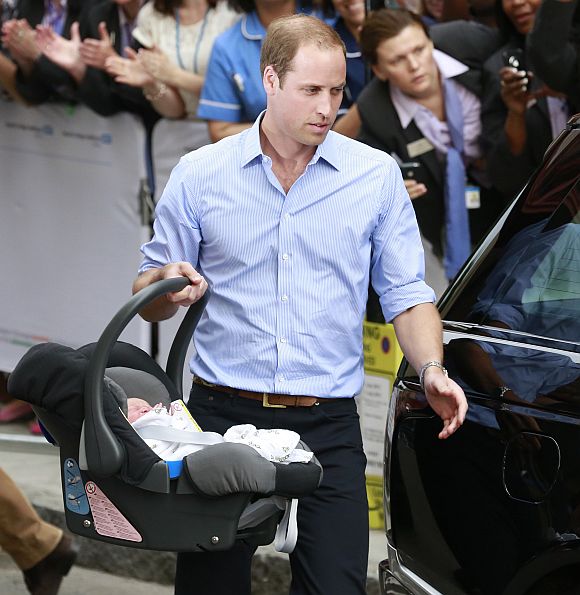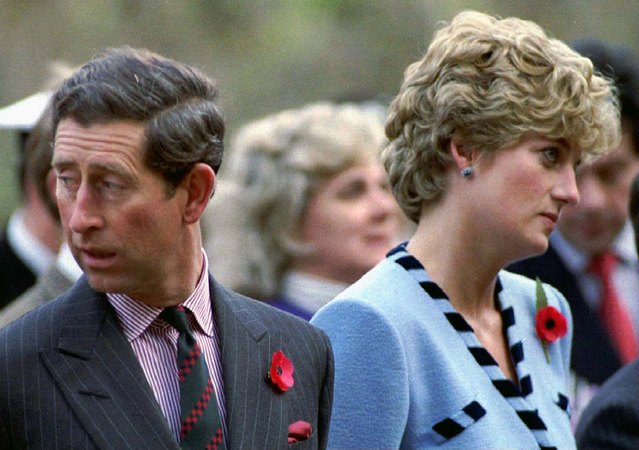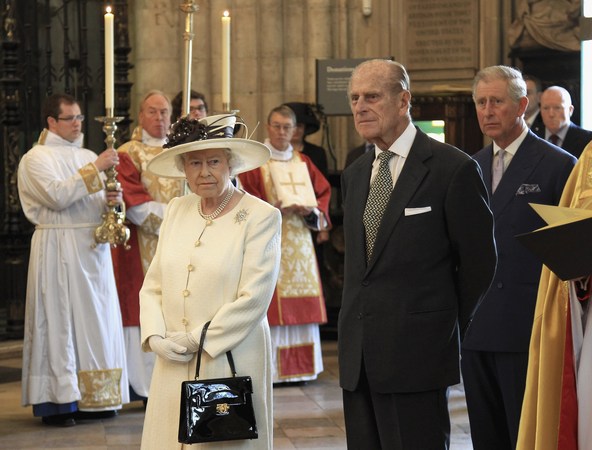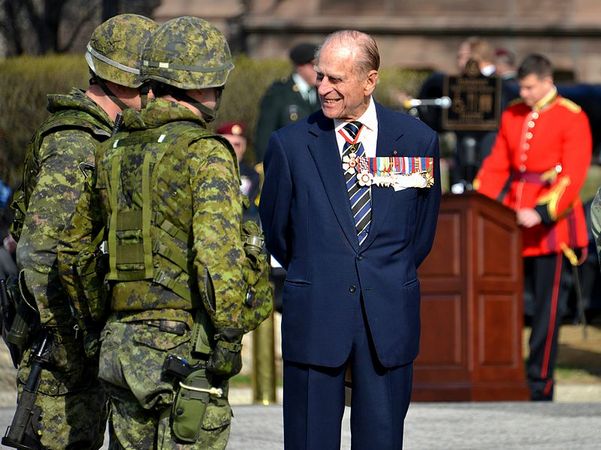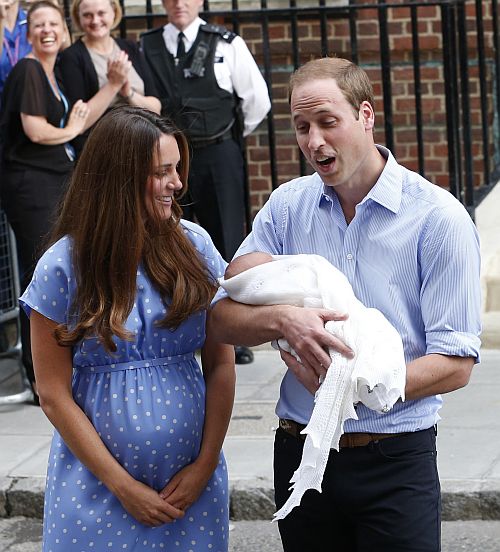 | « Back to article | Print this article |
The burden of being a son, a father and a prince
By all estimates, young George Alexander Louis will lead a less formal life than his father. Child of a broken marriage, Prince William has been showing all signs of becoming a far different father than Charles has been and way different than Philip was, more hands-on and a man of action rather than one who has a retinue of nannies and governesses.
But playing dad AND prince is no easy job.
Here's looking at the three generations of fathers and sons of the British royal family and how they've handled it all:
Sleeves rolled up, car seat in hand and no aides to assist him, Prince William cut an unlikely figure of a royal father as he carried young prince George into a black Range Rover parked outside London's St Mary's Hospital and drove his family to Kensington Palace before heading to Bucklebury, the home of his in-laws, the Middletons.
If these few glimpses of the young royal family are anything to go by, William will be a more hands on parent than his father, Prince Charles, has ever been.
The sartorial differences between William and Charles as they walked out with their respective first-borns a little over three decades apart from the same hospital are as stark as the similarities between Kate and Diana's polka dotted dresses.
On June 22, 1982, when Diana and Charles walked out of St Mary's with newborn William, the Prince of Wales was dressed in a pinstriped suit, complete with a flower on his jacket's lapel. He held William briefly for the camerapersons present to capture the historic moment before handing him back to Diana who deftly settled in the backseat of the car. Charles walked around, sat next to her and they were driven off.
On the other hand, William carried George himself, buckled the baby's car seat, got behind the wheel and drove the Rover as Kate settled next to her baby, ensuring (seemingly) that the seat was properly fastened.
Over the decades, royal families across the world have become a little less stuck up and like to present themselves as being everyday people rather than exalted beings. But it seems evident that William and Kate are keen to take it even a step further, promising their child a far less formal life. They have, for instance, not hired a nanny. Not yet at least.
Penny Junor, author of Prince William: Born to be King, points out in a Daily Mail column that the only person the couple has employed is a housekeeper at Kensington Palace.
'They have done most of this for themselves for the past three years while living in a rented cottage in Anglesey near William's RAF rescue helicopter base. They've only employed a woman to help with cleaning,' she writes.
The burden of being a son, a father and a prince
The choices William has made haven't come as a surprise to royal watchers who hark back to the prince's growing up days when he found more comfort in the arms of his nannies than with his parents, whose marriage by some estimates was strained from quite early on.
That too shouldn't have come as a shock, for Diana, though born an aristocrat, was the 'People's Princess' -- a title she carried proudly -- while Charles was quite the straitjacketed royal.
Look for Prince Charles' photographs online and be assured that you'll find almost no photographs of him outside of a suit (and, of course, a kilt). The least formal outfit he seems to own is a three-piece suit.
If William's rolled up sleeves reveal him as being a hands-on dad, Charles' sartorial preference to should give you a fair idea of the extent of his involvement as a father.
While Junor does suggest that he was 'besotted by them (his children) and, in private, delighted in playing with them and putting on silly voices or pulling faces to make them laugh,' the two young princes were largely raised by their nannies having for adult company footmen and butlers and valets.
Then again, neither Diana nor Charles knew any different for they were raised in a similar manner by a battery of governesses who would have them starched and ironed to be presented before their parents at tea.
The burden of being a son, a father and a prince
Various tell-all biographies have thrown considerable light on the rocky relationship between Prince Charles and his father, Prince Philip.
Charles is believed to be quite frightened of his father, according to one biographer, Graham Turner, who quotes an aide as saying: "Charles deals with it by disengaging. That is why he doesn't play a bigger role in family affairs. His father often doesn't let him get a look-in. Charles is far too sensitive."
It is also generally believed that it was Philip who steamrolled Charles into marrying Diana. He disapproved of Charles' affair with Camilla Parker-Bowles, believing his son to be 'precious and extravagant'. By some accounts, he also believed his son lacked the dedication to become a good king.
Charles has almost always been at the receiving end of criticism -- both in private and public. His subjects have often held him and his affair with Camilla responsible for the breakdown of his marriage to Diana. The sympathy wave that swept Britain after her death was directed more at the two young princes rather than him.
Good or bad, the job Charles has been groomed for is yet to fall in his lap. Time magazine turned to Kipling's novella to describe the Prince on its cover as 'The man who would be King'. This was in the summer of 1978. Charles continues to be waiting in the wings. Patiently. Ensconced in the womb of his double-breasted suits.
The burden of being a son, a father and a prince
The one thing you must know about Philip is that, though he comes from a royal family, he wasn't always rich. According to his biography, Young Prince Philip: His Turbulent Early Life by Philip Eade, at one point the infant Philip's bed was a discarded fruit crate!
Once the heir to the Greek throne, Philip's family was exiled in 1921 after Greece abolished monarchy. When he was seven, his mother Princess Alice of Battenberg became mentally unstable while his father, Prince Andrew of Greece and Denmark, decided to spend most of his time with a French mistress.
For the better or worse, young Philip was passed among relatives who were quite an interesting lot themselves. For starters there was his great-aunt Ella, sister to the Tzarina Alexandra and aunt to Princess Anastasia. Ella dedicated her life to the Russian poor only to be blown up by a grenade after being thrown into a pit by the Bolsheviks.
Then there was an uncle, George who was romantically attached to his own uncle Waldemar and an aunt Nada, Marchioness of Milford Haven, who is said to have had an affair with the American heiress Gloria Vanderbilt.
Various relatives paid for his education in France, England, Germany and Scotland -- Philip is fluent in English, French and German.
After completing his education Philip joined the British Royal Navy and began correspondence with the then 13-year-old Princess Elizabeth who was his third cousin through Queen Victoria.
The burden of being a son, a father and a prince
After serving with the Mediterranean and Pacific fleets during World War II, Philip was granted permission by George VI to marry his daughter, Elizabeth. He would go on to abandon not just his religion, converting from Greek Orthodoxy to Anglicanism but also become a British citizen and adopting the surname Mountbatten from his British maternal grandparents.
Indeed, Philip's maternal uncle was Louis Mountbatten, the last Viceroy of India and with whose wife Jawaharlal Nehru is said to have had an affair. It is after this uncle that the newborn Prince George Alexander Louis gets his last name.
Prince Philip's primary claim to fame may be his gaffes, which range from being sexist to racist depending on the nonagenarian's mood. Even so, Eade suggests that this is perhaps his way of coping with the tough life he's led in the past. The biographer quotes a shrink as describing Philip's personality as being 'highly defended', laughing off things in order to prevent emotional questions of any sort.
By these standards, the 31-year-old Prince William has managed to hold himself pretty well. Rather than going off the rails, or becoming closeted, William has reached out and forged bonds with the people he cares for. He has bided his time with Kate, even living in with her before popping the question.
Reams of newsprint has been spent on reporting how close he has become to the Middletons, with whom he spent the previous Christmas, breaking tradition by giving the Royal Family gathering at the Sandringham Estate a pass.
In the years to come, there is no doubt that William's parenting skills will be put to test with the media attempting to invade on the young family's privacy, much like they did with his own parents.
It would however be safe to wager your bets on the new father to protect his family and give them a normal life. As normal as a prince can afford.
